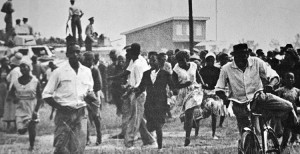Sharpeville Massacre 60
Friday, March 20th, 2020March 20, 2020
Tomorrow, March 21, marks 60 years since the Sharpeville Massacre took place in South Africa in 1960. On that day, South African police opened fire into a crowd of black demonstrators. The incident occurred in the township of Sharpeville, now part of the city of Vereeniging. The shooting left 69 people dead and more than 180 wounded.

People flee from gunfire during the Sharpeville Massacre in South Africa on March 21, 1960. Credit: Universal History Archive/UIG via Getty images
The demonstration in Sharpeville was part of a nationwide protest against the pass laws. The pass laws required black adults to carry identity papers called passes. They also restricted the movement of black people around the country. The pass laws were part of a policy of rigid racial segregation called apartheid. The policy had existed in South Africa since 1948.
An antiapartheid group called the Pan Africanist Congress (PAC) organized the protest. The group called on black South Africans to go to police stations without their passes on March 21, 1960, and peacefully submit to arrest. Only a few demonstrators responded in most cities. In Sharpeville, however, several thousand protesters gathered outside the police station. A few hundred police officers faced them from behind a wire fence surrounding the station. In the early afternoon, the officers began to fire, probably in confused reaction to a scuffle between police and protesters near the fence. Many demonstrators were shot in the back as they fled.
The events at Sharpeville had long-lasting effects on the antiapartheid campaign. At first, the shooting sparked large demonstrations in sympathy for the victims. The government then banned the PAC and the African National Congress (ANC), a larger antiapartheid organization. Forced underground, the organizations altered their tactics to include violent forms of protest. Outrage over the deaths at Sharpeville also helped spur an international antiapartheid movement.
Apartheid ended in South Africa during the early 1990’s. Today, South Africans honor March 21, the anniversary of the Sharpeville Massacre, as Human Rights Day.


